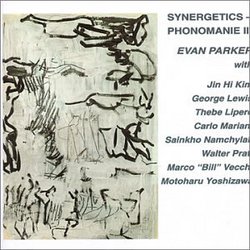| All Artists: Evan Parker Title: Synergetics: Phonomanie III Members Wishing: 2 Total Copies: 0 Label: Leo Records UK Release Date: 2/29/2000 Genres: Jazz, Pop Style: Avant Garde & Free Jazz Number of Discs: 2 SwapaCD Credits: 2 UPCs: 5024792023929, 803680487006 |
Search - Evan Parker :: Synergetics: Phonomanie III
 | Evan Parker Synergetics: Phonomanie III Genres: Jazz, Pop
|
Larger Image |
CD Details |
CD Reviews"worldy" sounds? Adolph Pinelad | Montreal, Quebec Canada | 01/31/2005 (5 out of 5 stars) "This is one of those(are there others?) Evan Parker recordings where he delves into the textures of unorthodox instruments for improvisation. Unorthodox in the more orthodox sense of the sounds one comes to expect hearing in these "free" endeavors. But expectations can in fact be irrelevant. Evan Parker is joined for this live recording by several musicians that play some sort of "worldy" instrument, not common to the free improvisation scene. There is an instrument called laauneddas, which sounds similar to a bagpipe, played by Carlos Mariani, who, as does Parker, employs an impressive technique of circular breathing. There is also a Vietnamese harp played by Jin Hi Kim and an african Didgeridoo(Thebe Lipere) called an imbumbu. Motoharu Yoshizawa is an added talent to the bass and vocals. More comon collaborators include the fascinating George Lewis on trombone, who brings to the mix his computer program for interactive improvisation called Voyager, adding to the already "bizarre" soundscape. The enigmatic vocals of Sainkho Namchylak, are also innovative, and regular Parker electronic ensemble Marco Vecchi and Walter Prati are present as space manipulating agents. So once you have this slightly "off-beat" combination of diverse musical voices, the term "worldy" becomes somewhat present. But this is Evan Parker, and what happens is one of the most interesting set of dynamics ever recorded. Instead of producing a sound that some "new-age, pretty sound" lover would like, this recording, breaks through the mediocrity that post-colonial studies have implanted upon most individuals who just go with the flow, and creates a complex and intellectual sound that is charged with a sensiblity only experienced through free improvisation. More than just being a forced form of dialog representing the dominance of one culture over another, it attains the true(or at least "a" true) spirit of a world language, a language connected through the structure of free improvisation, where cultural boundaries are only significant as synergetic elements involved in the production of a new and profound whole. -Synergetics are defined as a system, an integral system, whose behavior cannot be predicted by the individual actions of its components- The performance is set up mostly by series of interchanging duos, where the musicians get to know another performer through direct improvisation, and finally these small fragments build up into a large ensemble improvisation (They also build down from the large ensemble to the small, usually two person improvisation). The electronics work in such a subtle way, that one is transported unknowingly to a surreal realm of impossible, yet totally real, sound. What is done by Prati and Vecchi, is a series of real-time loops and time alterations, over which the "live" improvisors have to respond to as well. More impressive is that this recording, as mentioned earlier, is a live recording, totally unedited and presented intact. This record, in my opinion, is for those individuals who take seriously their explorations into music, since this is by no means easy listening. Definitely one of the more complex recordings that Parker has to offer, in which his trademark sound(if one could call his sound trademark) is put into a new context -where a fragment of time was occupied by the creative efforts of a brilliant ensemble, made possible to persist and get to us through this record. Highly recommended. (The cd includes a decent booklet, a couple of pages long, which is always a nice plus for those who like that)" An experiment that doesn't quite communicate to the listener N. Dorward | Toronto, ON Canada | 12/07/1999 (2 out of 5 stars) "Evan Parker's recent groupings have often involved situations where free improvisation is mingled with real-time electronic processing. These discs take this setup a step further by including a variety of world musics: the throatsinging of Sainkho Namchylak, the launeddas (a type of bagpipe) of Carlos Mariani, the African percussion of Thebe Lipere, & the komungo (a Korean instrument sort of like a koto) of Jin Hi Kim. The electronics are handled by Parker's longtime collaborators Walter Prati & Marco Vecchi; George Lewis contributes both trombone & his Voyager computer program; and the excellent Motoharu Yoshizawa plays bass. So far so good, but on the whole I find this recording very unsatisfactory: besides the obvious problems of simple noncommunication between such different players, & the persistent musical deadspots, there is the just-adequate recording quality, & the fact that most of the material involving Prati & Vecchi ended up being left off the released CDs because of distortions caused by the high frequencies their electronics produced. The result is an enigmatic set of performances: the best are quite good (e.g. the Kim/Parker duo on disc one), but on the whole _Synergetics_ can at best be called "interesting", rarely communicating more urgently to the listener. Those interested in Parker's use of electronics should instead head to the superb Electronics Ensemble discs on ECM."
|

 Track Listings (9) - Disc #1
Track Listings (9) - Disc #1